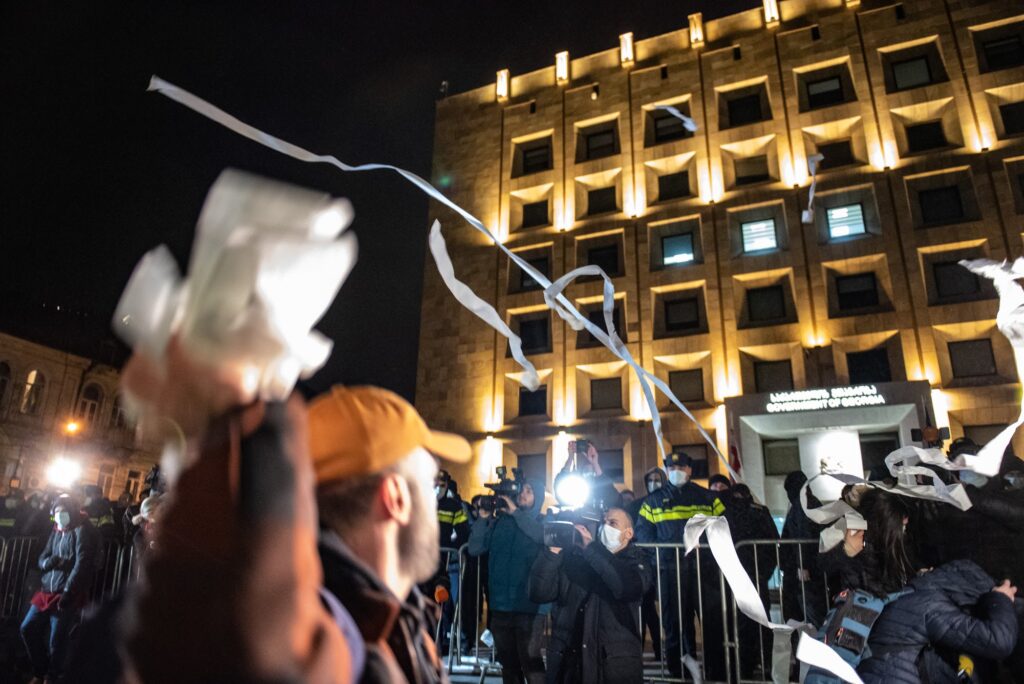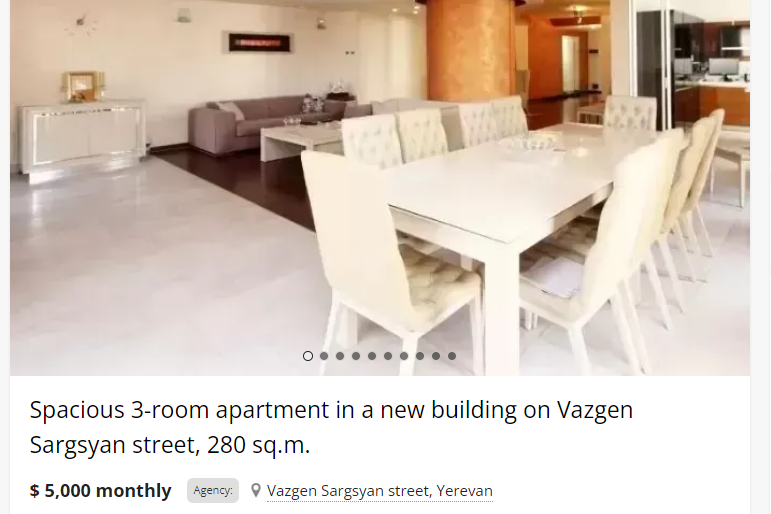
Rents in the Armenian and Georgian capitals have more than doubled since Russia’s invasion of Ukraine, as Russians, Ukrainians, and Belarusians have sought to escape war, repression, and crippling sanctions.
Narine Gevorgyan, a University student living in Yerevan, has been renting a three-room apartment near the city centre with her five friends for over two years, for roughly $260 per month. Their landlord is evicting them because they are unable to pay an additional $150 per month.
‘We still didn’t find a new house. The prices are too high’, Gevorgyan told OC Media. If she does not find an apartment soon, she said she has no way of continuing to attend her classes and has no choice but to put her education on hold.
The situation is hardly better in Tbilisi.
Thirty-one-year-old Natalia (she requested her last name to be withheld) has lived in her one-bedroom Tbilisi for nearly a year. In the second week of March, her landlord informed her that his relatives were ‘coming from Russia’ and that she had to urgently vacate the apartment.
Natalia tried to stave off the eviction by offering to pay more for rent.
‘I offered to pay ₾800 ($250) instead of the agreed ₾600 ($190) and he said “yes”,’ Natalia told OC Media.
Eventually, Natalia found out that the owner of her apartment had rented out several more flats in her building and had told all his tenants the same story, about supposed relatives coming from Russia, and their need to vacate. He had simply used the story to raise rents for all of them.
But that wasn’t the end of Natalia’s ordeal.
‘A few days later, a pipe fell from my balcony and damaged a neighbour’s car. The landlord demanded that I have to reimburse damages, and when I objected, he told me to leave,’ Natalia explained. The extra ₾200 ($60), it appears, was not enough.
Real estate agents and rental agencies in both capitals have told OC Media that prices have shot up even in neighbourhoods far outside the touristic centres. According to opposition MP Vahe Hakobyan, roughly 6,000 Russians were arriving in Yerevan daily — with estimates of up to 80,000 having arrived in the city as of 8 March.
Georgian Interior Minister Vakhtang Gomelauri told parliament on Thursday that the rate of Russian citizens crossing the Georgian border this year was 50% lower than in the same period in 2019, although he did not name a specific number.
Before that, on 7 March The Minister of Economy of Georgia Levan Davitashvili, claimed that 20,000—25,000 Russian visitors came to Georgia so far this year, a comparable number to 2020.
In the South Caucasus, the influx of tens of thousands of people seeking long-term housing into cities with a relatively small population — Yerevan has a population of 1 million, Tbilisi 1.2 million — has translated into an unprecedented spike in demand for housing and a commensurate increase in prices.
In Yerevan, for instance, rents for a one-bedroom apartment which varied between $150 to $400 now averages between $600—$700. A similar price multiplication has taken place in Tbilisi.
Both Armenia and Georgia offer visa-free access for Russian and Belarusian citizens. Russia has a reciprocal visa-free regime with Armenia but requires Georgians to apply for a visa. The latter requirement has been one of the grievances cited by demonstrators in recent protests in Georgia, which featured calls to end Georgia’s visa-free regime for Russian citizens.
[Read more: Georgian police arrest 15 pro-Ukraine activists for TPing government offices]

War, repression, and economic collapse
The population influx into Armenia and Georgia began on 24 February when Russia attacked Ukraine, using adjoining territory to Ukraine, including the separatist regions of Donetsk and Luhansk, Crimea, and Belarus to invade on multiple fronts. In response to the invasion, Western countries have placed unprecedented sanctions on Russia and Belarus — leading to a severe economic crisis.
New laws in the two authoritarian allies have ratcheted up repression against those who might oppose the war. One recent law passed by the Russian parliament, for instance, punishes spreading ‘fake information’ about the Russian military — for instance calling the invasion of Ukraine a war, rather than a ‘military operation’ with up to 15 years in prison.
Some have estimated that roughly 200,000 residents of Russia have gone abroad since the war began, with thousands joining every day. This exodus, of course, pales in comparison to the number of Ukrainian refugees created by Putin’s war with the United Nations estimating that over 3,000,000 refugees have fled the country — most heading to Poland, Moldova, and Romania.

Protest and selective rent increases
Elodie Gavrilof-Dernigorossian, who lives in central Yerevan, told OC Media that her landlord evicted her after doubling her rent from $400 to $800, and she refused to pay.
She said knows of dozens of similar cases. She said that she and other recent victims of eviction or shock rent increases are now discussing how to create a ‘movement’ or ‘protest’ against the situation.
‘No one should stay on the streets because of this’, she said.
In Tbilisi, some landlords appear to change rents according to tenant citizenship.
‘Online, landlords might indicate a rent of $300 per month, but when I call to find out the terms, they immediately ask me who will stay in the apartment’, Tbilisi real estate agent Maia Kochlamazashvili told OC Media. ‘When I tell them, that Russians or Belarusians, they change the price at that moment and say they will not rent for less than $800.’
Generally speaking, however, Kochlamazashvili noted that there have been price increases across the board, regardless of a tenant’s nationality. This, she added, would likely be a particular burden for local residents in Armenia and Georgia — where wages are much lower than in Russia and Belarus.
‘Local people are also in a very difficult situation’, she said. ‘Who could afford to pay $800 to $900 for a one-room apartment?’








